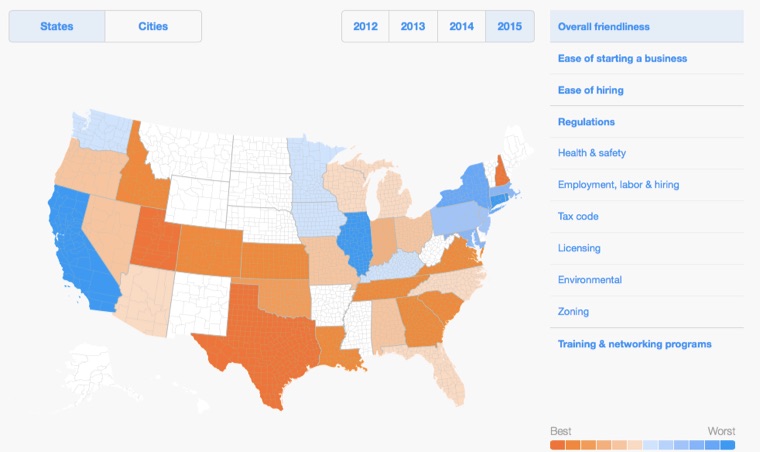Texas is the most small business friendly state in the U.S. and Manchester, N.H., is the most small business-friendly city, according to the fourth annual Thumbtack.com Small Business Friendliness Survey, released today. Thumbtack, a personal services “on-demand” marketplace, asked nearly 18,000 small businesses to rate their state and city governments across a broad range of policy factors. “Small business owners on Thumbtack have consistently told us that they welcome support from their governments but are frequently frustrated by unnecessary bureaucratic obstacles.” said Jon Lieber, chief economist of Thumbtack.com.
Top 10 Most Small Business Friendly States
- Texas
- New Hampshire
- Utah
- Louisiana
- Colorado
- Idaho
- Tennessee
- Virginia
- Georgia
- Kansas
10 Most Small Business Friendly Cities
- Manchester, N.H.
- Dallas, Tex.
- Richmond, Va.
- Austin, Tex.
- Knoxville, Tenn.
- Nashville, Tenn.
- Houston, Tex.
- Fort Collins, Colo.
- Boulder, Colo.
- San Antonio, Tex
Interactive maps can be found at Thumbtack.com.
Cities | States

Or click directly to a state.
What Makes a State or City Small Business Friendly?
The survey included several factors for small businesses to rank when judging the business-friendliness of their city and state. This year, the small businesses surveyed ranked these the top factors determining if a city or state is small business friendly:
Training | Quality training on developing a business and navigating the local economic and policy environment is the most important factor that influences a small business’s perception of business friendliness.
Licensing | Ease of compliance with licensing rules mattered far more than even tax rates. Cities where licensed professionals find complicated requirements or inconsistent enforcement had the lowest approval scores.
Web Help | Small businesses are increasingly equating the user friendliness of a city’s small business-oriented websites with the business-friendliness of the city. Easy-to-use websites that provide useful information and decrease the costs of regulatory compliance improve overall perceptions of a local or state government. Business owners who said their city had a “great” website ranked their cities 13 percent higher than those who ranked their’s lower.
More findings from the survey:
- Small business owners gave California, Connecticut, Illinois, and Rhode Island an “F,” while Massachusetts, Maryland, and New York earned a “D” grade.
- Providence, New Haven, Buffalo, Albuquerque, and Hartford were the survey’s worst-performing cities as rated by their small business owners.
- Small businesses in Texas and Utah have rated their states in the top five every year this survey has run, while California and Rhode Island have been rated in the bottom five every year.
- Professionals who weren’t required to have a license judged their cities and states in a more favorable light; however, respondents who were required to carry a license but said that complying with licensing rules was “very easy” were just as favorable towards their government as respondents who weren’t required to have a license at all.
- Entrepreneurs’ perceptions of their tax burdens were among the least important factors in judging governments.
